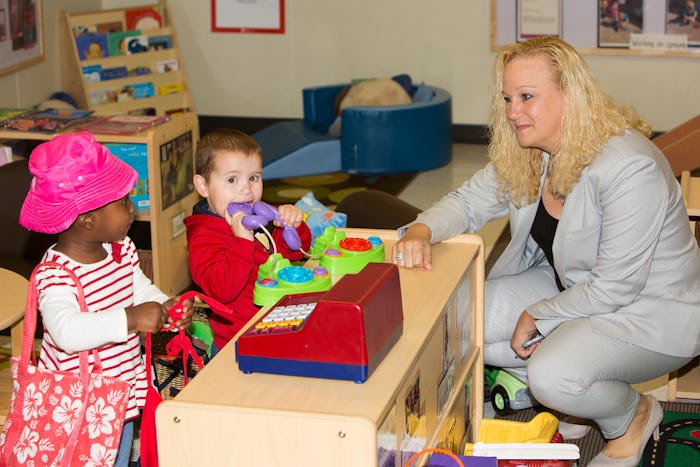News

Should Child Care Workers Need College Degrees?
In December, new regulations affecting child care centers in Washington, D.C., went into place, requiring lead teachers to have an associate's degree at minimum and center directors to have a bachelor's degree. Both assistant teachers and home care providers must have Child Development Associate credentials, and all child care providers must earn their new minimum credentials by December 2020. But do child care workers need college degrees in the first place? And in positions that are well-known for low wages, how are child care workers expected to cover the costs of education?
As it turns out, research has shown that there's an advantage to having child care workers with higher education. According to a 2015 report by the National Academies of Sciences, Engineering, and Medicine, the current practices around child care for kids from birth to age 8 haven't caught up to what experts currently know about learning and development. Many early child care workers have only high school degrees — but they need further education to learn how to challenge and support young infants' complex learning skills.
According to The Washington Post, more advanced degrees would help teachers recognize learning disabilities so interventions could occur earlier, as well as aid them in expanding kids' vocabularies and crafting experiences that guide kids' learning. Essentially, the researchers found that child care workers need the same training that elementary school teachers receive in order to adequately support infants and toddlers.
That's the research that's guided D.C.'s push for more credentialed child care staff — and in an ideal world, all day care workers would have bachelor's degrees. However, the cost of education in the United States is incredibly high: according to CNBC, the average cost of a four-year degree at a public university was $9,139 per year in 2015. And according to the Bureau of Labor Statistics, child care workers' hourly mean wage is $10.26, and D.C. child care employees earn a mean annual wage of $26,900. To make matters worse, D.C. is one of the states with the highest wages for child care workers, meaning education requirements might be hard to implement in other, lower-paying states.
D.C. is helping teachers out with both locally and federally funded T.E.A.C.H. scholarships; and, the T.E.A.C.H. Early Childhood National Center told The Washington Post that participants generally earn 8 percent more for each year they study and earn bonuses or promotions at work. But sometimes those teachers will leave child care work and go on to teach at schools, where their credentials can earn them higher pay.
"This is a real opportunity to build the profession and set our young children on a positive trajectory for learning and development," Elizabeth Groginsky, assistant superintendent of early learning in D.C., told The Washington Post.
Hopefully, if things go well in D.C. and its higher education experiment yields positive results for children, the rest of the United States will see more local and federal funding for child care workers' education. In the meantime, do look out for child care centers with more formally educated employees — but be ready to pay the price difference for the education upgrade.